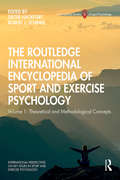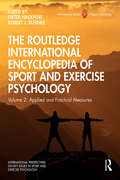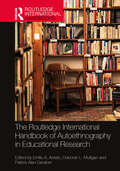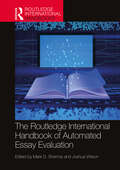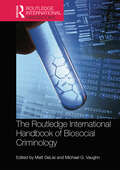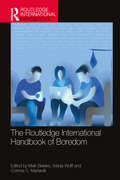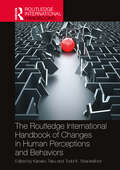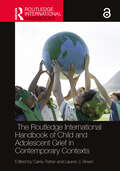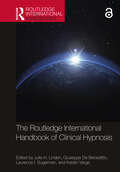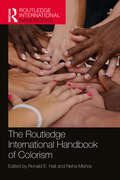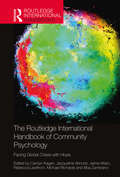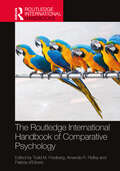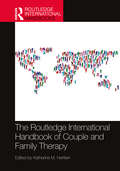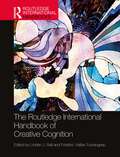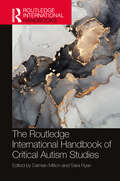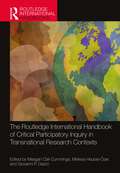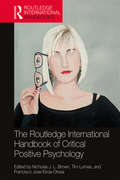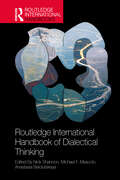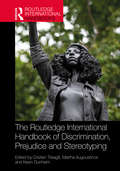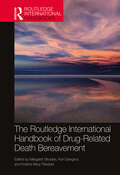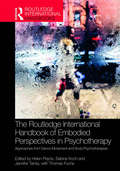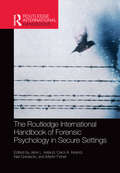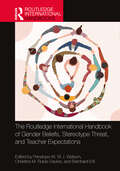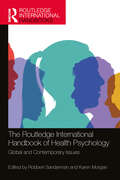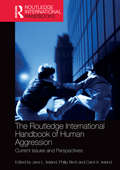- Table View
- List View
The Routledge International Encyclopedia of Sport and Exercise Psychology: Volume 1: Theoretical and Methodological Concepts (ISSP Key Issues in Sport and Exercise Psychology)
by Dieter HackfortThe Routledge International Encyclopedia of Sport and Exercise Psychology integrates the topics of motor control, physical education, exercise, adventure, performance in sports, and the performing arts, in several important ways and contexts, drawing upon diverse cultural perspectives. More than 90 overarching topics have been systematically developed by internationally renowned experts in theory, research, and practice. Each contribution delves into a thematic area with more nuanced vocabulary. The terminology drawn upon integrates traditional discourse and emerging topic matter into a state-of-the-art two-volume set. Volume 1: Theoretical and Methodological Concepts is comprised of theoretical topic matter, spanning theories and terminology from psychology contextualized to sport and physical activity, sport psychology-focused theories, and expansive discussions related to philosophy of science and methodology. Volume 2: Applied and Practical Measures draws upon practical concepts that bridge theory and research and practice. Broader issues that extend beyond sport and physical activity participants are embedded within the entries, intended to augment physical, mental, and social well-being. This expansive encyclopedia is a must-have resource for all professionals, scholars, and students in the fields of sport psychology and sport science.
The Routledge International Encyclopedia of Sport and Exercise Psychology: Volume 2: Applied and Practical Measures (ISSP Key Issues in Sport and Exercise Psychology)
by Dieter HackfortThe Routledge International Encyclopedia of Sport and Exercise Psychology integrates the topics of motor control, physical education, exercise, adventure, performance in sports, and the performing arts, in several important ways and contexts, drawing upon diverse cultural perspectives. More than 90 overarching topics have been systematically developed by internationally renowned experts in theory, research, and practice. Each contribution delves into a thematic area with more nuanced vocabulary. The terminology drawn upon integrates traditional discourse and emerging topic matter into a state-of-the-art two-volume set. Volume 1: Theoretical and Methodological Concepts is comprised of theoretical topic matter, spanning theories and terminology from psychology contextualized to sport and physical activity, sport psychology-focused theories, and expansive discussions related to philosophy of science and methodology. Volume 2: Applied and Practical Measures draws upon practical concepts that bridge theory and research and practice. Broader issues that extend beyond sport and physical activity participants are embedded within the entries, intended to augment physical, mental, and social well-being. This expansive encyclopedia is a must-have resource for all professionals, scholars, and students in the fields of sport psychology and sport science.
The Routledge International Handbook of Autoethnography in Educational Research (Routledge International Handbooks)
by Patrick Alan Danaher Deborah L. Mulligan Emilio A. AntelizThe Routledge International Handbook of Autoethnography in Educational Research presents diverse and rigorous contemporary research at the intersection between autoethnography and educational research. The handbook investigates the bidirectional connection between autoethnography and educational research in relation to four themes: enhancing teaching and teacher education with autoethnography; enlarging doctoral study and supervision with autoethnography; conducting identity work and relationship-building via autoethnography; and promoting social justice through autoethnography. In addition to the synthesising introduction and conclusion chapters, the 27 main chapters in the handbook cover current research from Africa, Aotearoa New Zealand, Australia, Bangladesh, Canada, Spain, the United Kingdom, the United States and Venezuela. The chapters present novel applications of several key concepts and research methods, including activism, arts-based research, critical reflection, decolonising feminism, doctoral study and supervision, hybrid identities, Indigenous research, migrant education, racism, researcher self-efficacy, teacher identity, visual autoethnography and writing as voice. This book will be of use to all researchers, and doctoral and Masters students, using qualitative and autoethnographic methods in Education and related fields.
The Routledge International Handbook of Automated Essay Evaluation (Routledge International Handbooks)
by Joshua Wilson Mark D. ShermisThe Routledge International Handbook of Automated Essay Evaluation (AEE) is a definitive guide at the intersection of automation, artificial intelligence, and education. This volume encapsulates the ongoing advancement of AEE, reflecting its application in both large-scale and classroom-based assessments to support teaching and learning endeavors.It presents a comprehensive overview of AEE's current applications, including its extension into reading, speech, mathematics, and writing research; modern automated feedback systems; critical issues in automated evaluation such as psychometrics, fairness, bias, transparency, and validity; and the technological innovations that fuel current and future developments in this field. As AEE approaches a tipping point of global implementation, this Handbook stands as an essential resource, advocating for the conscientious adoption of AEE tools to enhance educational practices ethically. The Handbook will benefit readers by equipping them with the knowledge to thoughtfully integrate AEE, thereby enriching educational assessment, teaching, and learning worldwide.Aimed at researchers, educators, AEE developers, and policymakers, the Handbook is poised not only to chart the current landscape but also to stimulate scholarly discourse, define and inform best practices, and propel and guide future innovations.
The Routledge International Handbook of Biosocial Criminology (Routledge International Handbooks)
by Matt DeLisi; Michael G. VaughnBiosocial criminology is an interdisciplinary field that aims to explain crime and antisocial behavior by exploring both biological factors and environmental factors. Since the mapping of the human genome, scientists have been able to study the biosocial causes of human behaviour with the greatest specificity. After decades of almost exclusive sociological focus, criminology has undergone a paradigm shift where the field is more interdisciplinary and this book combines perspectives from criminology and sociology with contributions from fields such as genetics, neuropsychology, and evolutionary psychology. The Routledge International Handbook of Biosocial Criminology is the largest and most comprehensive work of its kind, and is organized into five sections that collectively span the terrain of biosocial research on antisocial behavior. Bringing together leading experts from around the world, this book considers the criminological, genetic and neuropsychological foundations of offending, as well as the legal and criminal justice applications of biosocial criminological theory. The handbook is essential reading for students, researchers, and practitioners from across the social, behavioural, and natural sciences who are engaged in the study of antisocial behaviour.
The Routledge International Handbook of Boredom (Routledge International Handbooks)
by Maik Bieleke Wanja Wolff Corinna S. MartarelliThis comprehensive text is a unique handbook dedicated to research on boredom. The book brings together leading contributors from across three continents and numerous fields to provide an interdisciplinary exploration of boredom, its theoretical underpinnings, its experiential properties, and the applied contexts in which it occurs.Boredom is often viewed as a mental state with little utility, though recent research suggests that it can be a powerful motivator of human behavior that shapes our actions in many ways. The book examines boredom from a range of perspectives and is comprised of three parts. Part I delves into the theoretical approaches to boredom, presenting methods for its measurement, explaining when and why boredom occurs, and scrutinizing the impact it has on our behavior. Part II focuses on the psychological and neural properties of boredom and its associations with a multitude of mental and interpersonal processes, such as self-control, mind-wandering, flow, and aggression. Part III presents boredom in practical contexts like school and work, and sheds light on its role for health-related behaviors, psychosocial well-being, and aesthetic experiences. The book concludes by summarizing the state of boredom research, identifying promising areas for future research, and providing directions for how research on boredom can be advanced. As the authoritative book on boredom, this handbook is an essential resource for students and researchers of psychology, sociology, education, sport science, and computer science.
The Routledge International Handbook of Changes in Human Perceptions and Behaviors (Routledge International Handbooks)
by Todd K. Shackelford Kanako TakuThe Routledge International Handbook of Changes in Human Perceptions and Behaviors is the first edited volume to present multidisciplinary perspectives on various aspects of changes that humans experience.The handbook is designed to highlight the different contents, types, ways, meanings, applications, and moments of changes that have been recognized by experts in various fields within the life and social sciences. Comprised of four sections, the chapters address changes in a variety of contexts related to human perceptions and behaviors; the moment of change and fluctuations; changes in applied settings; and the meaning of changes, including resistance to change. Written by a range of expert international contributors, the book brings together discussions and insights about how different levels and types of changes in human perceptions, attitudes, beliefs, values, and behaviors have been studied and considered in diverse fields. It also explores the various mechanisms that account for changes, exploring how and when changes occur and what changes mean to humans.Relevant for empirical and theoretical work, the handbook will be of great interest to researchers, academics, and postgraduate students across psychology, behavioral sciences, and social sciences.
The Routledge International Handbook of Child and Adolescent Grief in Contemporary Contexts (Routledge International Handbooks)
by Carrie Traher and Lauren J. BreenThis volume presents the leading research in child and adolescent grief from a diverse and global perspective, focusing on the systemic, political, and cultural processes that have a direct bearing on the way youth experience loss and grief. Carrie Traher and Lauren J. Breen bring together a global community of academics, practitioners, and social activists to discuss and address the complexity of lived experiences of grief for young people today. Presented in four parts, the contributors begin by providing a theoretical overview of youth, grief, and bereavement, before moving onto other important topics, such as suicide bereavement, the trauma of war, digital grief narratives, child soldiering, and more. Within each chapter, authors address contemporary theoretical frameworks, research findings, and praxis related to both death and non-death losses, such as the Black Lives Matter movement, environmental grief, and grief on the internet and social media. Including contributors from a range of countries and from various disciplines, such as educators, health care professionals, policy makers, and advocates, the themes of coping, resilience, and growth are central and interwoven in each chapter. This handbook is essential for researchers, clinicians, scholars, educators, parents, and activists as to the most pressing societal and global issues that affect youth grief today and to provide context to their personal and professional interactions with youth. Chapter 9 of this book is freely available as a downloadable Open Access PDF at http://www.taylorfrancis.com under a Creative Commons Attribution-Non Commercial-No Derivatives (CC-BY-NC-ND) 4.0 license.
The Routledge International Handbook of Clinical Hypnosis (Routledge International Handbooks)
by Laurence I. Sugarman Julie H. Linden Giuseppe De Benedittis Katalin VargaThe Routledge International Handbook of Clinical Hypnosis explores and clarifies the challenge of defining what hypnosis is and how best to integrate it into treatment.It contains state-of-the-art neuroscience, cutting-edge practice, and future-oriented visions of clinical hypnosis integrated into all aspects of health and clinical care. Chapters gather current research, theories, and applications in order to view clinical hypnosis through the lens of neurobiological plasticity and reveal the central role of hypnosis in health care. This handbook catalogs the utility of clinical hypnosis as a biopsychosocial intervention amid a broad range of treatment modalities and contexts. It features contributions from esteemed international contributors, covering topics such as self-hypnosis, key theories of hypnosis, hypnosis and trauma, hypnosis and chronic pain management, attachment, and more.This handbook is essential for researchers, clinicians, and newcomers to clinical hypnosis, in medical schools, hospitals, and other healthcare settings.Chapters 4, 35, 62 and 63 of this book are freely available as a downloadable Open Access PDF at http://www.taylorfrancis.com under a Creative Commons Attribution-Non Commercial-No Derivatives (CC-BY-NC-ND) 4.0 license.
The Routledge International Handbook of Colorism (Routledge International Handbooks)
by Ronald E. Hall Neha MishraThis timely and unique edited book explores the concept of colorism, which is discrimination based on the color of a person’s skin. It takes a global approach that draws on authentic voices from varied contexts and is dedicated to exploring and enriching the diverse intellectual discourse on colorism.The book explores colorism across the globe and studies how it has been woven into the cultural fabric of communities of color. With 22 chapters organised geographically into parts representing six continents, it looks at various facets of colorism, offering international insights beyond a Western perspective. The handbook examines policy-making in the sphere of colorism internationally and across countries, and provides thoughtful insights on colorism discrimination in different contexts. Chapters are written by leading experts from different disciplinary backgrounds who present cutting-edge research on the topic of colorism in different country contexts, contributing to a global dialogue on colorism.The Routledge International Handbook of Colorism comprehensively highlights colorism and skin color bias which blurs the national and international boundaries. It will be fascinating reading for students and academics in psychology, social work, education, criminal justice and other social sciences. It will also be of interest to those working in areas relating to marginalization, human rights, diversity and inclusion.
The Routledge International Handbook of Community Psychology: Facing Global Crises with Hope (Routledge International Handbooks)
by Carolyn KaganThis handbook offers a unique critical and cross-disciplinary approach to the study of Community Psychology, showing how it can address the systemic challenges arising from multiple crises facing people across the world. Addressing some of the most pressing issues of our times, the text shows how Community Psychology can contribute to principled social change, giving voice, enabling civic participation and supporting the realignment of social and economic power within planetary boundaries. Featuring a collaboration of contributions from world-leading academics, early career researchers and community leaders, each chapter gives theory and context with practical examples of working with those living in precarious situations, on matters that concern them most, and highlights positive ways to contribute to progressive change. The editors examine economic, ecological, demographic, gender, violence, energy, social and cultural, and political crises in relation to psychological theories, as well as public policy and lived experiences, presenting an approach situated at the intersection of public policy and lived experiences. Viewed through four different perspectives or lenses: a critical lens; a praxis lens; an ecological lens and a reflective lens, this compendium of critical explorations into Community Psychology shows how it can contribute to a fairer, more just, resilient and sustainable world. Also examining the lessons learnt from the COVID-19 pandemic about the pervading nature of social inequality, but also the potential of solidarity movements ranging from local to international levels, this is ideal reading for undergraduate and postgraduate students and scholars in Community Psychology and related areas, including social psychology, clinical psychology and applied psychology.
The Routledge International Handbook of Comparative Psychology (Routledge International Handbooks)
by Todd M. Freeberg Amanda R. Ridley Patrizia D’EttorreThe Routledge International Handbook of Comparative Psychology is an international reference work that offers scientists and students a balanced overview of current research in the field of comparative psychology and animal behavior. The book takes an integrative approach to animal behavior, with most of the chapters discussing research involving both proximate (developmental and mechanistic) and ultimate (functional and phylogenetic) levels of analysis. Chapters cover the major ideas of core topics in the field and examine emerging research trends to provide readers deeper understanding of these ideas. One of the strengths of this book is its the coverage of core topics in comparative psychology and animal behavior from different – and diverse – perspectives. The diverse perspectives come from the wide range of focal species studied by chapter authors, a range traditionally quite atypical for comparative psychology, and from the widespread international representation of the authors and the diversity of departments and research centers at which these authors work in. The first part of the Handbook examines historical and foundational principles and theories in the field. The second part focuses on individual behavior systems. The final part of the book is devoted to a diversity of ideas that extend our understanding of behavior into new directions. The Routledge International Handbook of Comparative Psychology is an essential resource for advanced undergraduate and graduate students, postdoctoral researchers, and established academics, as well as others who are interested in comparative psychology and animal behavior.
The Routledge International Handbook of Couple and Family Therapy (Routledge International Handbooks)
by Katherine M. HertleinThe Routledge International Handbook of Couple and Family Therapy is a comprehensive text that promotes innovative frameworks and interventions in couple and family therapy from a cross cultural perspective. A diverse range of international contributors explore the role that demography, regionality, cultural and political crises, and policy, have on the issues faced by couples and families. Collectively, the chapters articulate unique ideas in conceptualizing the needs of families with international backgrounds, adapting the current models and frameworks to work with this population most effectively. The text is split into four sections covering: personal voices and philosophical perspectives, theory and models, specific applications with international populations, and emerging perspectives. This handbook is essential for individual practitioners, researchers, psychotherapists, and related mental health professionals, as well as academics with an interest in working with couples and families.
The Routledge International Handbook of Creative Cognition (Routledge International Handbooks)
by Frédéric Vallée-Tourangeau Linden J. BallThe Routledge International Handbook of Creative Cognition is an authoritative reference work that offers a well-balanced overview of current scholarship across the full breadth of the rapidly expanding field of creative cognition. It contains 43 chapters written by world-leading researchers, covering foundational issues and concepts as well as state-of-the-art research developments. The handbook draws extensively on contemporary work exploring the cognitive representations and processes associated with creativity, whether studied in the laboratory or as it arises in real-world practice in domains such as education, art, science, entrepreneurship, design, and technological innovation. Chapters also examine the sociocognitive and cultural aspects of creativity in teams and organisations, while additionally capturing the latest research on the cognitive neuroscience of creativity. Providing a compelling synopsis of emerging trends and debates in the field of creative cognition and positioning these in relation to established findings and theories, this text provides a clear sense of the way in which new research is challenging traditional viewpoints. It is an essential reading for researchers in the field of creative cognition as well as advanced students wishing to learn more about the latest developments in this important and rapidly growing area of enquiry.
The Routledge International Handbook of Critical Autism Studies (Routledge International Handbooks)
by Damian Milton and Sara RyanThis handbook provides an authoritative and up-to-date overview of Critical Autism Studies and explores the different kinds of knowledges and their articulations, similarities, and differences across cultural contexts and key tensions within this subdiscipline. Critical Autism Studies is a developing area occupying an exciting space of development within learning and teaching in higher education. It has a strong trajectory within the autistic academic and advocate community in resistance and response to the persistence of autism retaining an identity as a genetic disorder of the brain. Divided into four parts • Conceptualising autism • Autistic identity • Community and culture • Practice and comprising 24 newly commissioned chapters written by academics and activists, it explores areas of education, Critical Race Theory, domestic violence and abuse, sexuality, biopolitics, health, and social care practices. It will be of interest to all scholars and students of disability studies, sociology, anthropology, cultural studies, education, health, social care, and political science.
The Routledge International Handbook of Critical Participatory Inquiry in Transnational Research Contexts
by Meagan Call-Cummings Giovanni P. Dazzo Melissa Hauber-ÖzerThe Routledge International Handbook of Critical Participatory Inquiry in Transnational Research Contexts illustrates how research guided by the emancipatory epistemology of critical participatory inquiry (CPI) can support social change in transnational contexts, which are inherently laden with unequal power dynamics and colonial structures. It builds on prior volumes in participatory action research, community-based participatory research, and decolonizing methodologies. This edited volume offers cases from across the Global South and Global North and from diverse disciplines including human rights, migration, education, health, youth studies, and development to demonstrate how CPI can fulfill its democratizing and decolonizing potential. Written primarily by new and emerging scholars, practitioners, and community leaders, these cases go on to illustrate how a critical participatory approach to transnational research can enhance the strength of research processes and findings, create more equitable and just experiences for those who participate as co-researchers, and facilitate social change. Providing a valuable framework for transnational CPI and a wealth of examples, it will be an invaluable read for undergraduate and graduate students of Development Studies, Healthcare disciplines, Education, and qualitative research. It will also be of interest to researchers, professionals, community leaders, and even funders and policymakers who want to work toward greater equity and social justice in transnational research contexts.
The Routledge International Handbook of Critical Positive Psychology (Routledge International Handbooks)
by Tim Lomas Nicholas J. Brown Francisco Jose Eiroa-OrosaSince the turn of the twenty-first century, the field of positive psychology has sought to implement a science of human flourishing so that we may lead happier, more fulfilling lives. It has found expression not only in academic papers but also popular books and, increasingly, in government policy. The Routledge International Handbook of Critical Positive Psychology is the first volume dedicated to a critical appraisal of this influential but controversial field of study. The book critically examines not only the scientific foundations of positive psychology, but also the sociocultural and political tenets on which the field rests. It evaluates the current field of knowledge and practice, and includes chapters analysing the methodological constructs of the field, as well as others that question what positive psychology actually means by ideas such as happiness or well-being. Taking the debate further, the book then discusses how positive psychology can be applied in a wider variety of settings than is presently the case, helping communities and individuals by acknowledging the reality of people’s lives rather than adhering strictly to debateable theoretical constructs. Including contributions from disciplines ranging from psychoanalysis to existential therapy, theology to philosophy, and contributors from throughout the world, The Routledge International Handbook of Critical Positive Psychology will be enlightening reading for anyone interested in how psychology has sought to understand human well-being.
The Routledge International Handbook of Dialectical Thinking (Routledge International Handbooks)
by Michael F. Mascolo Nick Shannon Anastasia BelolutskayaThe Routledge International Handbook of Dialectical Thinking is a landmark volume offering a multi-disciplinary compendium of the research, theory and practice that defines dialectical thinking, its importance and how it develops over the lifespan.For the first time, this handbook brings together theory and research on dialectical thinking as a psychological phenomenon from early childhood through the human lifespan. Grounding dialectical thinking in multiple philosophical traditions stemming from antiquity, it explores current psychological models of such thought patterns and shows how these can be applied in everyday life and across multiple disciplines, including philosophy, physics, mathematics and international relations. The handbook explains the nature of dialectical thinking, why it is important and how it can be developed in children and in adults. It concludes with a final chapter depicting a discussion among the authors, exploring the question "how could dialectical thinking be the antidote to dogma"Written by a group of international scholars, this comprehensive publication is an essential reference for researchers and graduate students in psychology and the social sciences, as well as scholars interested in integrating different perspectives and issues from a wide variety of disciplines.
The Routledge International Handbook of Discrimination, Prejudice and Stereotyping (Routledge International Handbooks)
by Cristian Tileagă Martha Augoustinos Kevin DurrheimThis handbook explores prejudice, stereotyping and discrimination primarily as phenomena embedded in the social organization of societies and connected to structural factors and larger societal systems. It offers a unique critical and cross-disciplinary approach to the study of contemporary manifestations of prejudice, stereotyping and discrimination. New socio-psychological analyses of the most pressing social problems of our age bring into view future directions of research on prejudice, stereotyping and discrimination oriented to social change and collective action and that engage with wider systems of norms and discourse. The editors draw on social psychology, sociology, social policy, clinical psychology, cultural studies and feminist, antiracist and decolonizing social science to show how social psychology can successfully rekindle its intellectual dialogue with kindred social science fields to create broader foundations for the exploration of the paradoxes lodged at the heart of the social expression of prejudice in liberal democracies. This is essential reading for anyone interested in prejudice, discrimination and stereotypes. The handbook will be of interest to academics and researchers exploring both the quantitative and qualitative aspects of discrimination, inequality and social exclusion, as well as students undertaking masters or doctoral studies in social psychology, political psychology and political science.
The Routledge International Handbook of Drug-Related Death Bereavement (Routledge International Handbooks)
by Kari Dyregrov Margaret Stroebe Kristine Berg TitlestadThis handbook provides a comprehensive overview of drug-related death bereavement to increase understanding and help direct scientific research, with contributions from across the globe.It is the first comprehensive, cross-cultural, multidisciplinary review of research on drug-related death (DRD)bereavement. Chapters cover the impact of DRD at individual, family, cultural, and societal levels, and topics include working with, and social support for, families following drug-related loss, understanding grief processes of individuals, drug policy, and the importance of cultural contexts. The book also elaborates on methodological issues when researching DRD.This handbook will increase understanding of DRD bereavement and contribute to support for DRD bereaved persons and those who care for them professionally and personally. It is essential reading for professionals and academics in the field as well as anyone affected by DRD.
The Routledge International Handbook of Embodied Perspectives in Psychotherapy: Approaches from Dance Movement and Body Psychotherapies (Routledge International Handbooks)
by Thomas Fuchs Jennifer Tantia Helen Payne Sabine KochThere is a growing interest in embodied approaches to psychotherapy internationally. This volume focuses on the respective focal professions of dance movement psychotherapy (DMP) and body psychotherapy (BP), addressing the psychotherapeutic need for healing throughout the lifespan. Within embodied clinical approaches, the therapist and client collaborate to discover how the body and movement can be used to strengthen positive relational skills, attending to the client's immediate and long-term needs through assessment, formulation, treatment and evaluation. Both DMP and BP are based upon the capacity and authority of the body and non-verbal communication to support and heal patients with diverse conditions, including trauma, unexplained bodily symptoms and other psychological distress, and to develop the clients’ emotional and relational capacities by listening to their bodies for integration and wellbeing. In The Routledge International Handbook of Embodied Perspectives in Psychotherapy, world leaders in the field contribute their expertise to showcase contemporary psychotherapeutic practice. They share perspectives from multiple models that have been developed throughout the world, providing information on theoretical advances and clinical practice, as well as discourse on the processes and therapeutic techniques employed individually and in groups. Presented in three parts, the book covers underpinning embodiment concepts, potentials of dance movement psychotherapy and of body psychotherapy, each of which is introduced with a scene-setting piece to allow the reader to easily engage with the content. With a strong focus on cross- and interdisciplinary perspectives, readers will find a wide compilation of embodied approaches to psychotherapy, allowing them to deepen and further their conceptualization and support best practice. This unique handbook will be of particular interest to clinical practitioners in the fields of body psychotherapy and dance movement psychotherapy as well as professionals from psychology, medicine, social work, counselling/psychotherapy and occupational therapy, and to those from related fields who are in search of information on the basic therapeutic principles and practice of body and movement psychotherapies and seeking to further their knowledge and understanding of the discipline. It is also an essential reference for academics and students of embodied psychotherapy, embodied cognitive science and clinical professions.
The Routledge International Handbook of Forensic Psychology in Secure Settings (Routledge International Handbooks)
by Carol A. Ireland Jane L. Ireland Martin Fisher Neil GredeckiThe Routledge International Handbook of Forensic Psychology in Secure Settings is the first volume to identify, discuss and analyse the most important psychological issues within prisons and secure hospitals. Including contributions from leading researchers and practitioners from the UK, US, Australia and Canada, the book covers not only the key groups that forensic psychologists work with, but also the treatment options available to them, workplace issues unique to secure settings, and some of the wider topics that impact upon offender populations. The book is divided into four sections: population and issues; treatment; staff and workplace issues; contemporary issues for forensic application. With chapters offering both theoretical rigour and practical application, this is a unique resource that will be essential reading for any student, researcher or practitioner of forensic psychology or criminology. It will also be relevant for those interested in social policy and social care.
The Routledge International Handbook of Gender Beliefs, Stereotype Threat, and Teacher Expectations (Routledge International Handbooks of Education)
by Christine M. Rubie-Davies Bernhard Ertl Penelope W. St J. WatsonThe Routledge International Handbook of Gender Beliefs, Stereotype Threat, and Teacher Expectations presents, for the first time, the work of leading researchers exploring the synergies and interrelationships between these fields, and provides a catalytic platform for advancing theory, practice, policy and research from an integrated perspective. An understanding of how gender beliefs, stereotype threat, and teacher expectations interrelate is vital to creating safe, equitable, and encouraging learning spaces. The collection summarises how gender beliefs, stereotype threat, and teacher expectations act in association to influence gendered student achievement, engagement, and self-beliefs, and suggests ways toward rectifying their negative effects. The chapters are organised into four sections: Gender Beliefs, Identity, Stereotypes, and Student Futures Stereotype Threat Teacher Expectations Synergies and Solutions By examining synergies and solutions shared between the three fields, this book creates more meaningful, consistent, and permanent approaches to achieving gender identity safety, gendered scholastic equity, well-being, and positive futures for students. This comprehensive publication brings together cutting-edge research at the intersection of gender beliefs, stereotype threat, and teacher expectations. It is an essential reference for researchers and postgraduate students in education and gender studies as well as educational, social, and developmental psychology.
The Routledge International Handbook of Health Psychology: Global and Contemporary Issues (Routledge International Handbooks)
by Karen Morgan Robbert SandermanThis state-of-the-art handbook provides authoritative, up to date coverage of health psychology topics, offering an excellent, in-depth view of the field. Leading experts provide essential insights into the discipline of health psychology, its roots, future directions, and the networks and organisations involved.Structured into eight parts, the book starts with defining health psychology including an important historical overview. Subsequent sections examine theories and methodology, health behaviour, interpersonal relations and health, chronic disease and interventions. The concluding sections tackle the important areas of global health psychology and the future of Health Psychology. The editors and auditors include leading experts in the field as well as early career researchers from over 20 countries across the world. Global representation was a key goal in selecting authors.While familiar areas receive ample attention this book strives to put the field of health psychology in context. As well as examining history it book spotlights global issues and explicitly mentions future developments and opportunities. The role of health psychology in the COVID-19 pandemic is considered and there is discussion more broadly on how health psychology can contribute to addressing societal challenges, including how to move forward sharing knowledge more firmly with policymakers.This is an essential resource for scholars, PhD students and research master students specialising in the field of health psychology.
The Routledge International Handbook of Human Aggression: Current Issues and Perspectives (Routledge International Handbooks)
by Jane L. Ireland, Philip Birch and Carol A. IrelandDrawing upon international expertise, and including some of the most well-known academics and practitioners in the field, The Routledge International Handbook of Human Aggression is the first reference work to fully capture how our understanding of aggression has been refined and reconceptualised in recent years. Divided into five sections, the handbook covers some of the most interesting and timely topics within human aggression research, with analysis of both indirect and direct forms of aggression, and including chapters on sexual aggression, workplace bullying, animal abuse, gang violence and female aggression. It recognises that, in many cases, aggression is an adaptive choice rather than a moral choice. Providing practitioners and academics with an up-to-date resource that covers broad areas of interest and application, the book will be essential reading for students, researchers and practitioners associated with a range of social science disciplines, including psychology, criminology, social work and sociology, particularly those with an interest in developmental, organisational, forensic and criminal justice allied disciplines.
